Western Digital's New VelociRaptor VR200M: 10K RPM at 450GB and 600GB
by Anand Lal Shimpi on April 6, 2010 8:00 AM EST- Posted in
- Storage
Overall System Performance using PCMark Vantage
Next up is PCMark Vantage, another system-wide performance suite. For those of you who aren’t familiar with PCMark Vantage, it ends up being the most real-world-like hard drive test I can come up with. It runs things like application launches, file searches, web browsing, contacts searching, video playback, photo editing and other completely mundane but real-world tasks. I’ve described the benchmark in great detail before but if you’d like to read up on what it does in particular, take a look at Futuremark’s whitepaper on the benchmark; it’s not perfect, but it’s good enough to be a member of a comprehensive storage benchmark suite. Any performance impacts here would most likely be reflected in the real world.
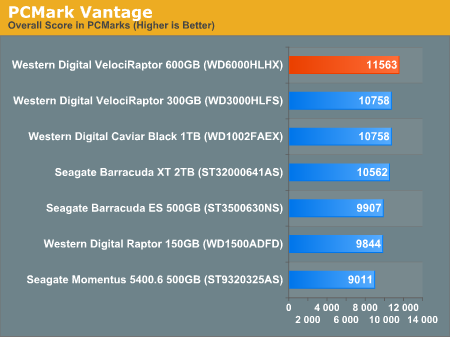
Impacting overall system performance with just a hard drive change is difficult if you're comparing fairly quick drives. You'll note that despite the competitive sequential speeds of the newer 7200RPM TB drives, the 300GB VelociRaptor is still on top. It just goes to show you the value of random access performance. It's not everything, but it's something worth paying attention to.
Compared to the old VelociRaptor, the new 600GB drive posts a 7% higher overall score in PCMark Vantage. The gains in the individual tests range from 3 to 20%.
The memories suite includes a test involving importing pictures into Windows Photo Gallery and editing them, a fairly benign task that easily falls into the category of being very influenced by disk performance.
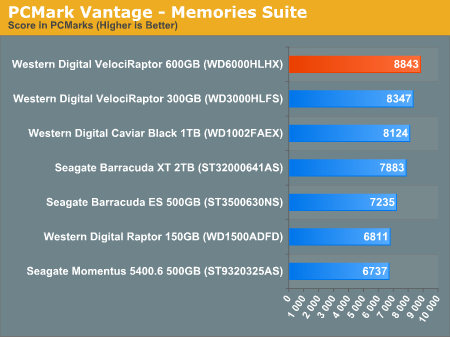
The TV and Movies tests focus on on video transcoding which is mostly CPU bound, but one of the tests involves Windows Media Center which tends to be disk bound.
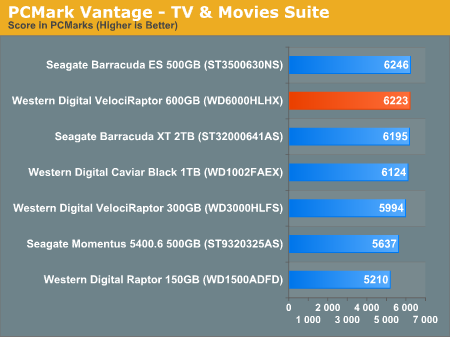
The gaming tests are effectively read tests since they spend a good portion of their time focusing on reading textures and loading level data. Actual game loading performance will differ depending on the game. Take these results as a best case scenario of what can happen, not the norm.
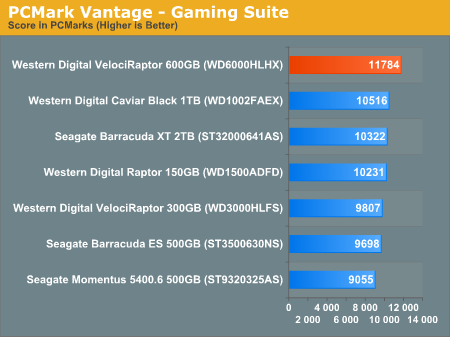
In the Music suite the main test is a multitasking scenario: the test simulates surfing the web in IE7, transcoding an audio file and adding music to Windows Media Player (the most disk intensive portion of the test).
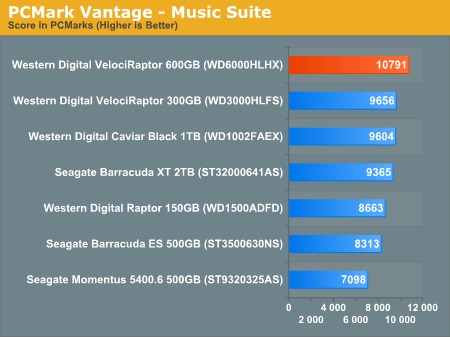
The Communications suite is made up of two tests, both involving light multitasking. The first test simulates data encryption/decryption while running message rules in Windows Mail. The second test simulates web surfing (including opening/closing tabs) in IE7, data decryption and running Windows Defender.
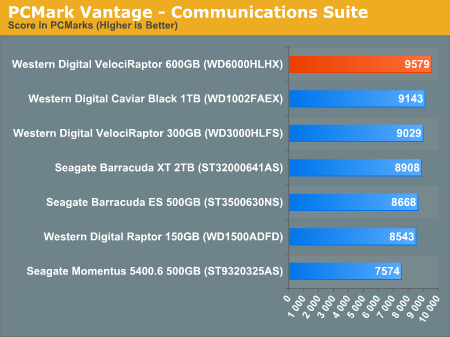
I love PCMark's Productivity test; in this test there are four tasks going on at once, searching through Windows contacts, searching through Windows Mail, browsing multiple webpages in IE7 and loading applications. This is as real world of a scenario as you get and it happens to be representative of one of the most frustrating HDD usage models - trying to do multiple things at once. There's nothing more annoying than trying to launch a simple application while you're doing other things in the background and have the load take forever.
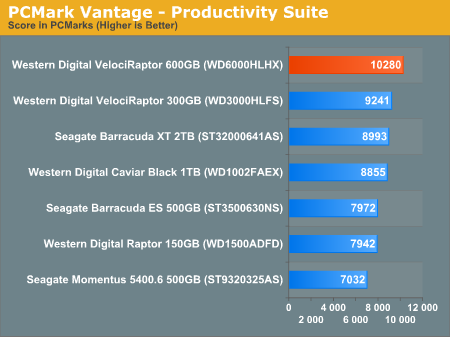
The final PCMark Vantage suite is HDD specific and this is where you'll see the biggest differences between the drives:
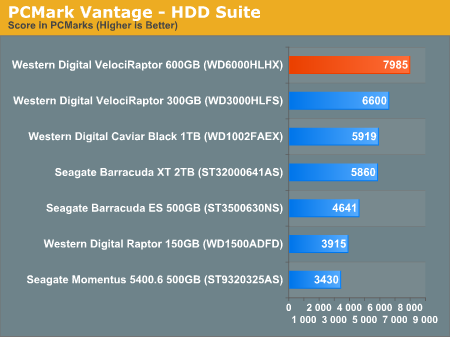










77 Comments
View All Comments
HotFoot - Tuesday, April 6, 2010 - link
People used to buy Raptors for the superior seek times. Where these drives were great was for loading programs. Throughput on large files isn't usually the consideration. RAID 0 does boost throughput, but increases seek time.But Raptors will never touch even the lowest-performance SSDs for random IO. These drives are completely obsolete as far as I can tell.
DanNeely - Tuesday, April 6, 2010 - link
Not quite completely, but the number of cases where a 7200RPM drive isn't fast enough, several hundred GB of high speed storage space is needed, and a $600-2000 sticker price for several SSDs is too high is much smaller than the raptor market was several years ago.I doubt we'll see a raptor revision after this one unless the cost of turning a SAS drive into a raptor is negligible.
marraco - Tuesday, April 6, 2010 - link
Worse, to match the storage capacity of the 450Gb raptor, you only need to use 10% of each 2Tb disk. This way you short stroke it, accelerating seek and random times.If you own an X58 chipset, you also may use the first partition as RAID0, and the remaining 90% space in RAID 0, or witouth RAID.
coolkev99 - Wednesday, April 7, 2010 - link
Not quite fair to compare the MSRP of a drive that's not even in the retail channel, to the discount OEM price of an existing drive.Belard - Tuesday, April 6, 2010 - link
Anyone else notice that "VR200M" is Subliminal Message to say "VROOM" as in fast? :)But these Raptors are simply not worth it any more. $330 for 600GB drive? Also they are the LOUDEST drives you can get over any other HD... and of course SDs wins hands down ag 0db.
The best setup is still the Hybrid SSD+HD for desktops.
$225 = 80GB intel X25-M G2 (Come on G3)
$ 85 = 1TB Seagate 7200.12 (On this review, Seagate are the quietest drives and its what I use)
$310 = Total for 1.08GB of storage that would dominate any Raptor.
synaesthetic - Tuesday, April 6, 2010 - link
No, not one 80GB X-25M.Two 40GB X-25V in RAID 0.
:D
Romulous - Monday, August 30, 2010 - link
You need to look at the point of the Raptor. Cheap, fast enterprise drives, which is a middle ground between sata and sas. I've setup several vsphere servers with 300GB raptors in raid 10 (8 drives) and they perform very well. Infact, even better than 8 15k sas drives in raid 5 on the same controller. For Virtual Machines, they work great. Of course this is no SAN thus no clustering is available.Xenoterranos - Tuesday, April 6, 2010 - link
Definitely glad I bought a 1TB caviar black. The performance benefits just aren't there given the loss in drive space, but for a high-end notebook, I could see it being a real competitor.AssBall - Tuesday, April 6, 2010 - link
.... Except that it is too tall to fit in notebooks.Glenn - Tuesday, April 6, 2010 - link
I bought into the first three generations of Raptors for the seek times. That is the single most irritating thing for me when using a higher performance computer. Damn HDs always slow everything down. I have migrated to SSDs now and will never look back.And often left unsaid in Raptor discussions, is their propensity to get noisier and noisier over there lifespan, to the point you think there are gremlins living inside your computer!